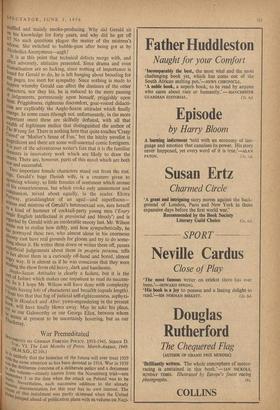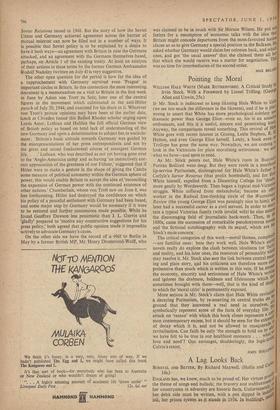War Premeditated
CU. MEWS ON GERMAN FOREIGN POLICY. 1918-1945. SERIES D. vat_ VI. The Last Months of ,Peace. March-August, 1949.
tr. £2 10s.) loth unlikely that the historian of the future will ever treat 1939 path tLhe same attention as has been devoted to 1914. War in 1939 Sedeliberate outcome of a deliberate policy and a document " Ites volume—already known from the Nuremberg trial—sets Ser tezici,.Mber 1 as the date when the attack on Poland was to be qi s6i.v Nevertheless, each successive addition to the already Y ti e documentation. for this year has its own interest. The ere St4t v3:u_ .01! this instalment was partly skimmed when the United Jumped ahead of publication plans with its volume on Nazi-
Soviet Relations issued in 1948. But the story of how the Soviet Union and Germany achieved agreement across the barrier of mutual mistrust can now be filled out in a number of ways. It is possible that Soviet policy is to be explained by a desire to have it both ways—an agreement with Britain in case the Germans attacked, and an agreement with the Germans themselves based, perhaps, on Article 1 of the existing treaty. At least an analysis of their actions in these terms by the former German Ambassador Rudolf Nadolny (written on July 4) is very suggestive.
The other open question for the period is how far the idea of a rapprochement with Germany survived even 'Prague' in important circles in Britain. In this connection the most interesting document is a memorandum on a visit to Britain in the first week in June by Adam von Trott zu Solz, later one of the central figures in the movement which culminated in the anti-Hitler putsch of July 20, 1944, and executed for his share in it. Whatever von Trott's private opinions may have been at the earlier date, lunch at Cliveden found this Balliol Rhodes scholar urging upon Lords Astor, Lothian and Halifax the full official German view of British policy as based on total lack of understanding of the new Germany and upon a determination to subject her,to encircle- ment: 'Britain's basic attitude towards Germany was guided by the misrepresentations of her press correspondents and not by the great and sound fundamental course of resurgent German
life ' Lothian. who was described as not yet having gone over to the 'Anglo-American camp' and as having 'an instinctively cor- rect appreciation of the greatness of our Ftihrer,' suggested that if Hitler were to make a gesture in the shape of giving the Czechs some measure of political autonomy within the German sphere of power, this would enable Britain to accept the idea of 'reconciling the expansion of German power with the continued existence of other nations.' Chamberlain, whom von Trott saw on June 8, was less forthcoming. Hitler had destroyed the confidence on which his policy of a peaceful settlement with Germany had been based, and some major step by Germany would be necessary if it were to be restored and further concessions made possible. While he found Geoffrey Dawson less pessimistic than J. L. Garvin and `gladly' prepared to 'receive any constructive suggestions for his press policy,' both agreed that public opinion made it impossible actively to advocate Germany's cause.
On the other side we have the record of a visit to Berlin in May by a former British MP, Mr. Henry Drummond-Wolff, who
was claimed to be in touch with Sir Horace Wilson. He put out feelers for a resumption of economic talks with the idea that Britain might concede departures from the most-favoured nation clause so as to give Germany a special position in the Balkans. 11e asked whether Germany would claim her colonies back, and which ones, and got 'the usual answer' that she claimed them all but that which she would receive was a matter for negotiation. This was no time for intermediaries of the second order.
MAX BELO?



































 Previous page
Previous page